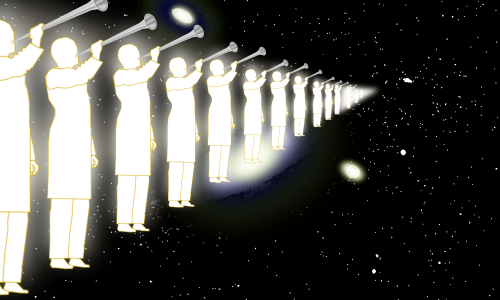
ingatheringand equated with the Feast of Tabernacles in the Bible. Every kingdom needs these things:
- King - Christ by the first omer
- Ruling Subjects - the Church, the bride (kings and priests) by the second Omer
- Territory - claimed at Atonement along with the occupants as potential subjects
- Government and unification - established during Tabernacles/Ingathering
- Perpetual new beginnings - the Eighth day
The Fall estivals show this in four stages:
God has chosen to establish His kingdom with a set of outcasts. The first part of the story is portrayed in the period from Passover to Shavuot. These outcasts become His children and inherit because they worship Him (you could check out what this site has to say on the subject of worship). The main focus set for the final season is exactly that.
This link takes you to the main article on time.
Outcasts - from rags to riches
All of the above are connected by the Feast of Trumpets because they all have trumpets. I attempt to provide the means of recognising the trumpets in these by an article called Outcasts_-_the_significance_in_the_shofar. The Feast of Trumpets has as its hilight the return of Christ and the Resurrection at the Last Trump, but it is really a celebration of the whole of the Kingdom of God: the preparation, the restoration and the future. The King (Christ) and its first citizens (the Church) are pictured as united at Pentecost but the reality of the union does not occur until Trumpets when they become of the same nature (elohim) at resurrection. After officially becoming pretender and heir apparent, comes the matter of securing the throne by Atonement.
The preceding scriptures define this feast season (from Trumpets to the eighth day) as the feast of ingathering
and the feast of tabernacles
. As the feast of ingathering it marked the bounty, the major harvest for the year. Although the whole period is referred to as the Feast of Tabernacles
in Deuteronomy 16:16, the booths were only used for seven days. God gives no explanation for the booths (tabernacles) except that they were a reminder of the time in the wilderness, but they present a striking contrast to the Promised Land. Booths are for people who have no home, they are temporary and typically makeshift. Booths are for outcasts. In talking of people of faith the writer of Hebrews makes this statement:
The same faith that makes us Abraham's seed can also cause us to be outcasts of this world. We need to make a choice. If we are friends of the world we may forfeit the kingdom but giving glory to God as outcasts ensures our deliverance. At Trumpets the tables turn for God's people and the outcasts become the exalted. The original Christians were hounded and eventually had to flee Jerusalem. Paul was variously mistreated and cast out because of his faith. We cannot be afraid to be outcasts if we want to inherit the Promised Land. There will always be a wilderness journey.
Outcasts - Delivered and Exalted at Trumpets
The Fall harvest begins with the Feast of Trumpets. That feast pictures the outcasts being delivered and exalted to high positions in the Kingdom. As a matter of fact they attain the highest positions in the kingdom: the king and queen (His consort, the Church).
King - Christ from the first omer
This subject is covered by the first season that we come before the Lord. From the first Omer Christ is accepted as the first of Firstfruits and entitled to be king. At that ceremony undoubtedly there were trumpets. The installation on His throne is postponed until His return to earth, where again trumpets comes in, and is in fact the key representation of the Feast of Trumpets. It is then, at the last trump, that He will be installed as King of the Earth which is now occupied by a tyrant.
Ruling Subjects - The Church from the second Omer
By the second Omer the Church is accepted as His consort so that the the kingdom can grow. The marriage is pictured by Pentecost when they are shown to be waved in the air and presented to God. Between those two points (the first and second omers) the Church is betrothed to Christ to be officially married when they are joined at the Last Trump. That point marks the true beginning of the Kingdom of God on Earth but it raises the question about the previous Trumps
. The name of the feast is plural (trumpets) and covers them also. The work to establish the Kingdom and end the tyranny on Earth began long ago, at the foundation of the world. I don't think that any of us would have been around to observe those trumpets but you can be sure that they were there.
Outcasts - Kingdom Redeemed at Atonement
The potential subjects and territory for the Kingdom are claimed at Atonement. I discuss some aspects of this in Outcasts - delivered and exalted like attempting to show the connection between Joshua and Revelation. This type of conquest employs trumpets. As a matter of fact sometimes the whole point of the trumpets is that they will be heard no more for that that purpose as with the demise of Babylon (Revelation 18:22). Once the King and His consort (first subjects) are united they set out to occupy their territory and restore it to its rightful owner during Atonement. Atonement is about restoration to the rightful owner, God. It is embodied in the jubilee festival where the trumpet is again featured.
Outcasts - Government and unification at Tabernacles or Ingathering
I have more to say on the subject of tabernacles or ingathering on its own webpage. The original name of the Feast of Tabernacles period was the Feast of Ingathering
. The Hebrew name for the Feast of Tabernacles is also translated Feast of booths
. The two names have completely different focuses. Ingathering focus on the final result. A shack or booth is makeshift and temporary. The nature of the first stage of God's Kingdom is temporary and apparently always will be. Men come into existence as flesh and all that we are and use apart from God is temporary. It is a tabernacle. This nature and all things associated with it will pass away when we are transformed into elohim and take on the nature of God. This is God's true ingathering, His rest. Paul talks of this earthly tabernacle and the sojourn that we have in it. As flesh we are given a choice of whether or not we will be God's children and become a part of His family or enjoy the pleasures of the flesh for a season and then death. Tabernacles and Ingathering presents us with a choice. Ingathering is on those who do well enough at resisting the pulls of the flesh to become a part of the government and unification. Tabernacles will come to ruin one way or another.
Second Chances - set up during the white throne
Just because someone is not able to overcome at first does not mean that they are a failure, time and chance affects us all. Actually nobody is ever able to overcome completely on their own. We all need the Holy Spirit, but that will be very plentiful in the world to come (Isaiah 44:3). Even so some will buckle under pressure whenever it is applied i.e. when exposed to Satan. But most will learn from it and once that pressure is removed they will be completely reliable. At the end of the millennium there is a White Throne period. During the white throne period the pressure of Satan will be removed and most will thrive and enter God's family to complete the ingathering. The end of the white throne judgement period is marked by an end to death and and the grave and the whole earth in its present form. It is again a celebration and will undoubtedly have trumpets.
Perpetual new beginnings - the Eighth day
Beyond the end of the earth is a new beginning and that heralds perpetual new beginnings that we cannot even dream of in our present minds. The eight day pictures the wonders to come that we cannot even imagine and they too will be celebrated with trumpets.

